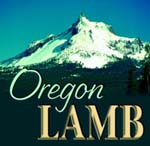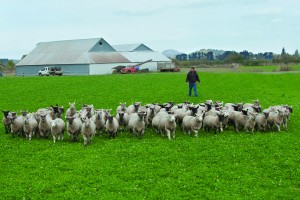To Market To Market – A visit to Anderson Ranches Oregon Lamb
This story begins with a farmer sitting in a brand new spic and span building with gleaming stainless steel, immaculate floors and a troop of workers who are wrapped in white, faces covered, hands gloved and knifed. The only color is the red of the meat before them. Everyone is calmly doing their jobs.
Reed Anderson started his ranch as soon as he could figure out how to get the money to begin. His grandmother would have preferred him a university graduate with a bonified job, working for the government, stable and secure from a hard life of farming. A possible life long struggle and financially vulnerable existence was her view of farm life and she knew this well. He smiles when he tells this story, most of the family save for four members, two of which are Reed’s own sons, took her advice. “She didn’t understand that the only thing I wanted to do was to get to my grandfathers farm every weekend, I couldn’t wait to be at that farm.” This is the story of a man and his wife who from the very beginning followed their passion and never swayed from their goal, it’s also the story of very intelligent owner/operators. Robyn and Reed both come from farming families and Robyn is very much part of the business and absolutely plays a major role in making things work. Anyone who owns a farm knows how important someone like Robyn is at your side.
Reed understands the genetics and breeding programs and the life of the grasses on his property that allow his lamb to grow into the finest quality product you can likely come across near or far. “People don’t really understand farming he says, it’s not a hobby and you likely won’t survive if it is without large chunks of supplemental income. One mistake can cost you everything if you are small.”
Anderson Ranches processes over 11,000 animals a year now. If the lamb is not grown on the farm itself the lamb arrives from his breeding stock, raised by other farmer suppliers who deliver the lamb when they are about five months old. This allows Anderson Ranches to do something that hardly anyone else in the country does, control the quality and life of the sheep so that they are stress free, live naturally and live on fields that are growing the grass which ultimately yields the highest quality meat. Grass management is another key to sustaining consistent quality. When you drive into Anderson Ranches you see the lush grasses that are grown in the number one grass growing region in the nation. Anderson Ranches feeds the lamb on these grasses exclusively and also harvests the seed it produces. The lamb that grow on these fields reach about 130 pounds solely eating grass and it makes the meat delicious and valuable. The meat that results in this farming technique is world class and in fact is now sold throughout the entire United States. Processing the lamb right on the farm allows for animals treated in the most ethical way you can imagine, cameras and the most modern equipment and techniques have been implemented and it shows in the meat. Once chefs use this product and understand that the quality is consistent it’s a game changer. Most people don’t maybe know that meat delivered to restaurants can be wildly irregular. Why? What happens is that if you ship your meat to a processor and you aren’t there to watch your animals being processed or in some cases cutting the meat yourself then your meat can be shipped under someone else’s label or theirs under yours. Farmers have taken extraordinary measures to try and stop this from happening, but it still does. When smaller producers can’t supply demand they often supplement their meat with meat from somewhere else. It’s not talked about much, but it makes farmers like Reed cringe. “Before I processed our own animals I’d go into a store and see someone else’s product with my label. It really pissed me off, but there wasn’t anything I could really do about it. Now, I control my lamb from the field to the market 100%, it’s what I had always dreamed of doing one day. Stores can still mislabel product, but I can at least control it to the location.”
Genetics plays a key role as well in lamb quality and production and Reed grows sheep that are of English descent that are comfortable in Oregon’s climate. Genetics is so important to healthy and happy animals Reed says. The lamb and breeding stock he raises gain weight faster and are adapted to this environment from hundreds of years of breeding. Most people don’t know that there are dozens of varieties of sheep, all breed for different reasons, and these ones are breed for meat quality and climate. He would love to get involved in bringing back cows that are bred the same way, for this climate and superior meat. It’s expensive to do this, but it’s something on his radar as well. More importantly though, he wants grandchildren!
Reed doesn’t need to worry about just making it anymore, these days he worries about using everything that the lamb has to offer. Up until now chefs only wanted the racks of lamb or a leg, now they get sweetbreads, ground lamb, and all the other parts to use. In early years these were just thrown away by the processors or added to dog food. Now dogs are eating the same cuts as people and the entire animal is used for consumption. It doesn’t get more sustainable than Anderson Ranch. The chefs that he supplies are getting creative with the whole animal and he often ships full sized carcasses which end up with more interesting restaurant dishes for consumers. Reed oversees the farm, his wife Robyn does all the books and then some, while his son Travis runs the new plant and his other son Jake manages the herds. Both are university graduates.
To order some Anderson Ranches Lamb visit:
Hours M-F 8am -6pm By Phone: (541) 466-5866 or



